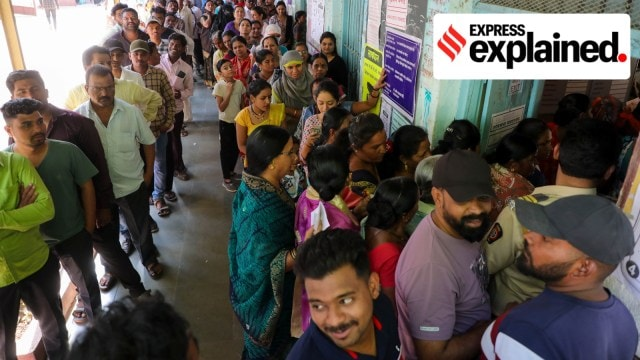WORKING OF POLL STATIONS IN INDIA

Copyright infringement not intended
Picture Courtesy: https://indianexpress.com/article/explained/expert-explains-india-polling-stations-work-9325944/
Context: India's polling stations are the heart of the country's democratic process, ensuring that millions of citizens can cast their votes in a free and fair manner.
Setting up Polling Stations
- The process begins with the District Election Officer (DEO), who is responsible for determining the locations of polling stations within their district.
- According to Section 25 of the Representation of the People Act, 1951, the DEO is mandated to compile and publish the list of polling stations.
Principles Guiding Setup
- Proximity: Polling stations are strategically located to ensure that voters do not have to travel more than two kilometres to cast their vote. This principle aims to facilitate access for all eligible voters, especially in remote or rural areas.
- Size and Capacity: Each polling station must have a minimum area of 20 square meters. Additionally, a station is designed to accommodate a maximum of 1,500 electors to maintain an efficient voting process.
- Flexibility: While these principles provide a general framework, there is flexibility to adapt to specific circumstances. For instance, in areas with challenging terrain, such as Arunachal Pradesh's Malogam, which caters to a single voter, or in densely populated urban areas where auxiliary polling stations may be set up to manage high voter turnout.
Location Selection
- Preference for Government Buildings: Polling stations are preferably located in government or semi-government institutions. This ensures accessibility and neutrality in the electoral process. Private buildings may be requisitioned if necessary, with proper authorization under the law.
- Verification and Updation: The list of polling stations undergoes regular verification and updation during annual electoral roll revisions. Input from local political parties and citizens is considered before finalizing the list, which is then approved by the Election Commission of India (ECI) and distributed to relevant stakeholders.
Facilities and Layout
- Polling stations are equipped with various facilities to ensure a smooth and efficient voting experience for citizens.
Layout
- Separate Entrances and Exits: Even if only one door is available, temporary fencing using bamboo and ropes creates separate entry and exit points to maintain order.
- Voting Compartment: Constructed from opaque materials, such as corrugated plastic sheets or steel grey flex boards, to ensure privacy. These compartments are positioned away from windows or doors to maintain confidentiality.
Assured Minimum Facilities (AMF)
- Gap Analysis: Before elections, a comprehensive gap analysis is conducted to ensure the provision of Assured Minimum Facilities (AMF) at each polling station. This includes adequate furniture, proper lighting arrangements, clear signage, and separate toilets for male and female voters.
- Heatwave Preparedness: During elections, especially in hot weather conditions, polling stations are equipped with shade structures, cooling devices, drinking water, and medical supplies to address challenges caused by heatwaves. Polling staff are trained to recognize and respond to heat-related illnesses.
Provisions for Persons with Disabilities (PwD)
- Accessibility: All polling stations are mandated to have ramps with a maximum gradient to ensure accessibility for persons with disabilities (PwD). Wheelchairs and designated parking spaces are provided, along with transport facilities for voters with impaired mobility.
- Assistance and Technology: PwD voters are allowed to cast their votes without waiting in queues, with the assistance of volunteers. Electronic Voting Machines (EVMs) and dummy ballot papers are equipped with Braille facilities for visually impaired voters. The Saksham App facilitates booking wheelchairs and other assistance services.
Voting Process and Personnel
Authorized Individuals Inside Polling Stations:
- Only specific individuals are permitted access inside polling stations, including registered electors, polling officers, candidates, media personnel, public servants on election duty, and authorized observers. This ensures the integrity and confidentiality of the voting process.
Polling Personnel and Duties
- A polling party typically comprises a Presiding Officer and three Polling Officers. Their duties include verifying the elector's identity, applying indelible ink, managing the EVMs, and ensuring the smooth conduct of the voting process.
Sector Officers and Observers
- Sector Officers or Zonal Magistrates are appointed to facilitate communication between polling staff and the Returning Officer. Micro Observers are deployed in vulnerable areas to report any deviations from electoral norms.
Regulations and Restrictions
Code of Conduct
- Strict regulations are enforced within and around polling stations to maintain impartiality and prevent any form of electoral malpractice. These include bans on political propaganda, the use of cameras or mobile phones, and canvassing within a specified radius of the polling station.
Enforcement
- Violations of electoral regulations can lead to penalties under the Representation of the People Act, including arrest without warrant. Candidates are required to set up their booths beyond a certain distance from the polling station, and restrictions are placed on the use of loudspeakers to ensure a peaceful voting environment.
Critical Polling Stations
Extra Measures for Security
- Critical polling stations identified based on factors such as vulnerability, abnormal voting patterns, or past incidents of violence, require additional security measures. Pre-poll confidence-building initiatives, feedback mechanisms, and deployment of security forces are undertaken to ensure the integrity of the voting process.
Conclusion
- India's polling stations are meticulously organised to facilitate a transparent, inclusive, and efficient electoral process. From setting up locations to ensuring facilities and security measures, every aspect is carefully planned to uphold the principles of democracy and enable citizens to exercise their voting rights freely.
Source:
|
PRACTICE QUESTION Q. Analyze the impact of money in politics and the influence of corporate and special interest groups on the electoral process. How can campaign finance reforms be implemented to reduce the potential for corruption and undue influence while respecting the principles of free speech and political expression? |



1.png)
